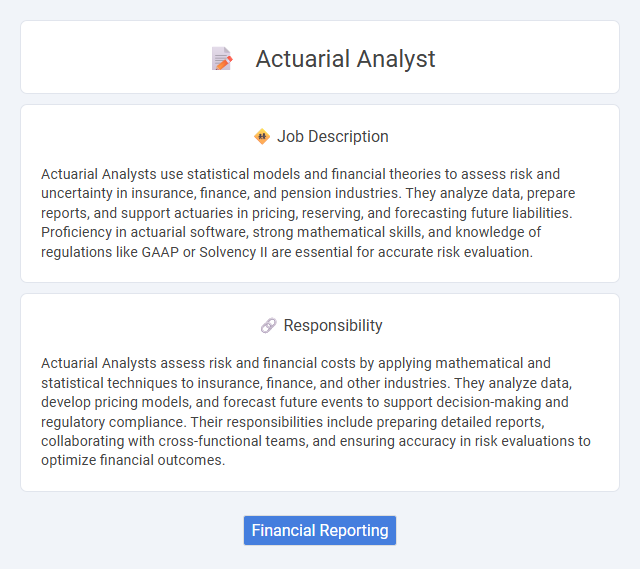
Actuarial Analysts use statistical models and financial theories to assess risk and uncertainty in insurance, finance, and pension industries. They analyze data, prepare reports, and support actuaries in pricing, reserving, and forecasting future liabilities. Proficiency in actuarial software, strong mathematical skills, and knowledge of regulations like GAAP or Solvency II are essential for accurate risk evaluation.
Individuals with strong analytical skills and a passion for mathematics are likely to be well-suited for an Actuarial Analyst role. Those comfortable working with data, statistics, and financial models may find this job fulfilling, as it involves assessing risk and predicting future financial outcomes. Candidates who possess attention to detail, patience, and problem-solving abilities probably have a higher chance of thriving in this career.
Qualification
An Actuarial Analyst typically requires a strong background in mathematics, statistics, and finance, with a bachelor's degree in actuarial science, mathematics, economics, or related fields. Proficiency in actuarial exams from recognized bodies such as the Society of Actuaries (SOA) or Casualty Actuarial Society (CAS) demonstrates essential technical expertise. Strong skills in data analysis software, programming languages like SQL, R, or Python, and knowledge of insurance or financial risk management further enhance qualification for this role.
Responsibility
Actuarial Analysts assess risk and financial costs by applying mathematical and statistical techniques to insurance, finance, and other industries. They analyze data, develop pricing models, and forecast future events to support decision-making and regulatory compliance. Their responsibilities include preparing detailed reports, collaborating with cross-functional teams, and ensuring accuracy in risk evaluations to optimize financial outcomes.
Benefit
Actuarial Analyst roles likely offer significant benefits such as competitive salaries and opportunities for career advancement within finance and insurance sectors. The position probably provides valuable experience in risk assessment and data analysis, enhancing long-term professional growth. Employers may also offer benefits like health insurance, retirement plans, and professional development support to attract top candidates.
Challenge
An Actuarial Analyst likely faces the challenge of interpreting complex data sets to accurately assess risk and predict financial outcomes. Navigating evolving regulations and economic fluctuations may require continuous learning and adaptability, making problem-solving skills essential. The role often demands balancing precision with efficiency under tight deadlines, creating a dynamic and intellectually stimulating environment.
Career Advancement
Actuarial Analyst roles offer significant career advancement through progressively complex risk assessment and financial modeling responsibilities. Mastery of statistical software such as SAS, R, and Python, combined with actuarial exams (SOA or CAS), accelerates promotion to senior analyst, actuarial consultant, or management positions. Continuous skills development in predictive analytics and regulatory compliance expands opportunities in insurance, finance, and pension sectors.
Key Terms
Financial Reporting
Actuarial Analysts specializing in Financial Reporting apply advanced statistical methods and financial theories to assess risk and ensure accurate valuation of insurance liabilities. They collaborate with accounting teams to prepare detailed financial statements compliant with regulatory standards such as IFRS 17 and GAAP. Expertise in data modeling, predictive analytics, and proficiency in software like SAS, R, or Excel plays a crucial role in generating transparent and reliable actuarial reports.
 kuljobs.com
kuljobs.com